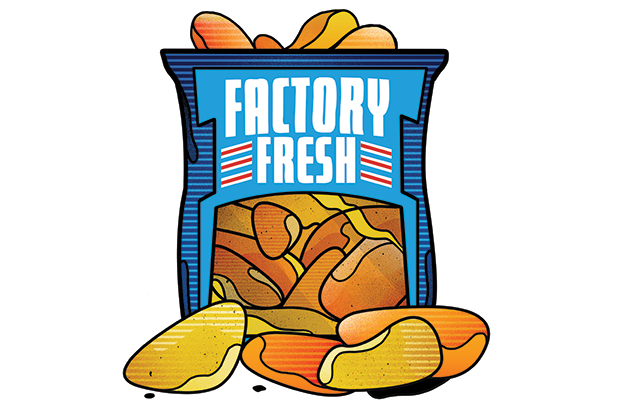To alleviate the pain for my brother and me of being sent back to boarding school, my mother would make potato crisps for us. She’d slice the potatoes carefully with a mandoline, lovingly fry them in sunflower oil, let them drain on a kitchen towel and sprinkle them with sea salt. They were nice, but — I hate to say this, Mum — they weren’t as delicious as salt & vinegar Crunchy Fries, a now defunct snack similar to a Chipstick. I tried adding vinegar to my mother’s crisps but they just went soggy.
When I’m abroad the thing I miss most about Britain is salt-and-vinegar crisps. None of that faux-natural Kettle Chip nonsense, but Golden Wonder (far superior to Walkers). When it comes to crisps, the nation agrees that the classics are best. Earlier this year Richard Osman from the television game show Pointless ran a World Cup of Crisps. Over one million votes were placed in a competition conducted on Twitter. In the final, pickled–onion Monster Munch triumphed over Wotsits.
Monster Munch aren’t even made from potatoes and they’ve never been near a pickled onion. They are cooked up in a laboratory and are all the better for it. As a child I imagined crisp factories to be wondrous Willa Wonka-esque places full of mad scientists concocting crazy flavours. (Flavoured crisps were actually invented in Ireland in the 1950s by Tayto. The Irish food aisle in my local supermarket is a wall ofTaytos. Their salt-and-vinegar is particularly fine.)
In Britain we aren’t noted for our culinary prowess but we are good at processed food. As the first country to industrialise, we were the first to create food for the machine age. Canning brought good-quality, healthy food high in vitamins and nutrients to the working classes in industrial cities. Canning preserves fresh foods, but soon scientists were creating entirely new kinds of food. Marmite, for example, is a by-product of Burton-on-Trent’s brewing industry.
It was in biscuits, however, that the food industry found its apotheosis. McVities, founded in Edinburgh in 1830, had a winning streak that ran from the chocolate digestive in 1925 to the launch of the Hobnob, the last great biscuit, in 1985. They’re still made in factories in Carlisle, Stockport, Halifax, Harlesden and Glasgow, though McVities is now owned by a Turkish company.
When I was growing up, plain digestives were regarded as positively ascetic. Crisps, too, were considered a health food. They were made from potatoes, dammit! Well — or maize and flavour enhancers, in the case of Monster Munch. But now our great British foods are under attack. At my daughter’s school they are specifically forbidden from bringing crisps and biscuits in their lunch boxes. The cult of wellness stalks the land with its pseudo–scientific pronouncements against gluten, sugar and ‘processed food’. We are told that sugar is as addictive as tobacco. Ella Woodward, the Nigella of wellness, wrote how she became ‘totally hooked on sugar-laden convenience food’. Jamie Oliver has campaigned successfully for a tax on sugar.
The American food writer Adam Gopnik makes a good point when he says that ‘every attempt to say what nature wants us to do turns out to be what someone thinks we ought to’. Wellness recipes substitute maple syrup for refined sugar but don’t explain why it’s healthier or more natural. They’re both sucrose and both come from plant sap. There’s a nasty streak of snobbery in the wellness movement: cheap foods that people like — biscuits, crisps, etc — are demonised, whereas expensive organic foods are considered healthy. Maple syrup is much more expensive than sugar. The sugar tax will disproportionately fall on the working class, the main consumers of fizzy drinks.
Cutting out gluten makes even less sense. Unless you’re a coeliac, it’s probably detrimental to your health. But the Hemsley sisters, who have a health-conscious cookery series on Channel 4, recently suggested replacing plain flour, 30p a kilo, with coconut flour at £5.
McVities tried a bit of substitution of their own in 2012 in order to make their digestive lower in saturated fat. Much to the horror of biscuit fans, the new ones turned out to be oily and crumbly. There was outcry across the land and sensibly in 2014 McVities reverted to the old recipe. Classic British biscuits don’t take kindly to improvement. My wife once attempted to bake chocolate digestive biscuits using organic flour and high-cocoa-fat chocolate. We both took a nibble and agreed that they weren’t a patch on McVities.
The truth is that biscuits taste best when made in a big factory. ‘Processed’ and ‘convenience’ are dirty words nowadays when it comes to food, but I think they should be celebrated. On a sustenance level they have enabled our society to thrive, but they can also be something unique and delicious. Bill Bryson referred to the chocolate digestive as ‘a British masterpiece’ — and they’re available in every corner shop in the country. They’re a truly egalitarian delicacy. So when I pack my daughter off to school with her carrot sticks and sandwiches, I like to smuggle in a couple of digestive biscuits wrapped in tinfoil. It feels subversive, and I know they’re good for her.
The post Factory fresh appeared first on The Spectator.
Got something to add? Join the discussion and comment below.
Get 10 issues for just $10
Subscribe to The Spectator Australia today for the next 10 magazine issues, plus full online access, for just $10.














Comments
Don't miss out
Join the conversation with other Spectator Australia readers. Subscribe to leave a comment.
SUBSCRIBEAlready a subscriber? Log in